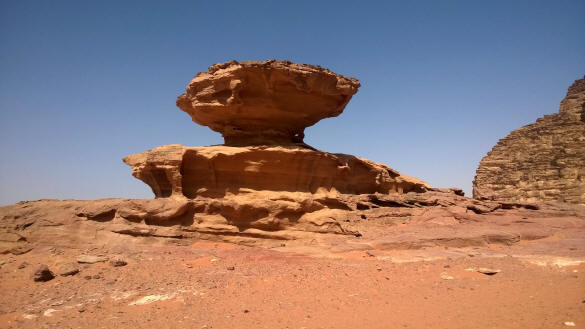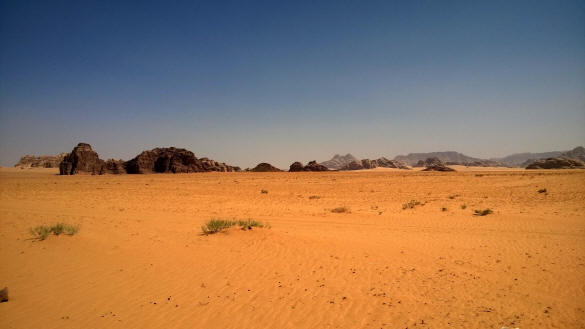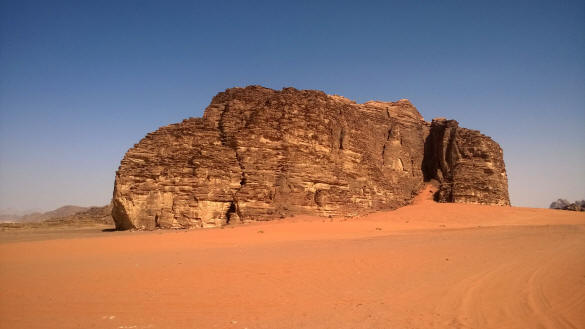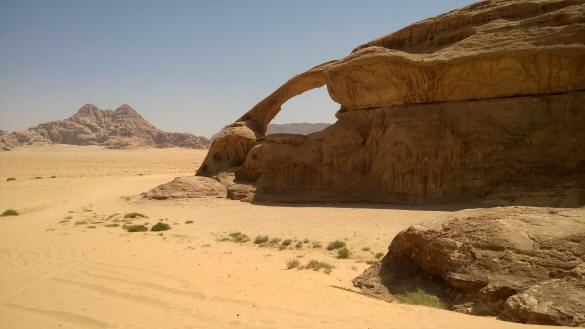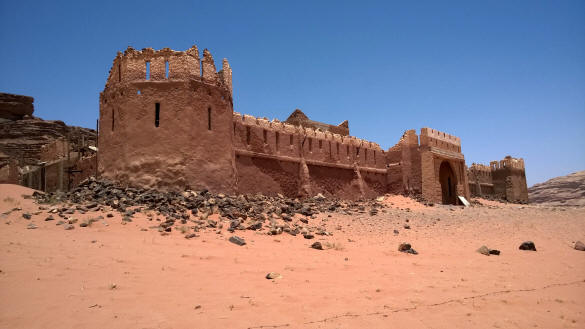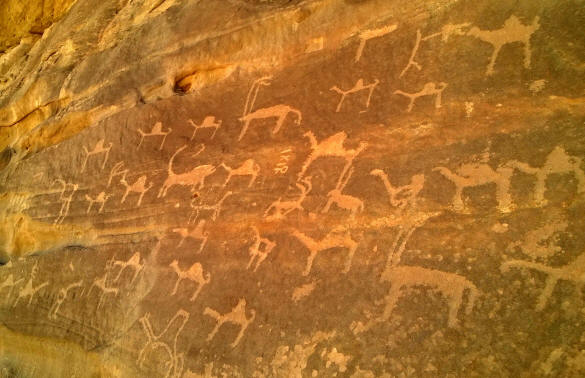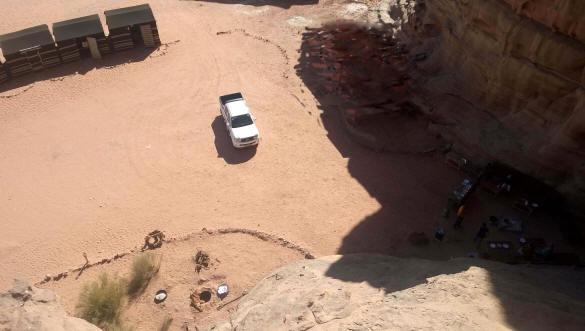|
Star Date: August 2015 |
||
| Hello Dear Family & Friends!
"Marhabar"
"No man can live this life and emerge
unchanged. He will carry, however faint, the yearning to return, weak or insistent according to his nature. For this cruel land can cast a spell which no temperate clime can match." (TE Lawrence,
Lawrence of Arabia, Seven Pillars of Wisdom
-writing of Wadi Rum in the
Wind, sun, stars! Out of the silence and stillness came the murmur of a breeze. Then a sudden gust of wind, sand filling each breath. A dust devil swirled like a small tornado and roared past the entrance of the canyon. Having been in a sand storm once in Egypt, we were happy it was just a brief expression of the might of Nature in this stark desert environment. As suddenly as it started stillness returned. Wadi Rum is where the desert sparkles, opening up an enchanting landscape of red sands and towering sandstone peaks. Lawrence of Arabia fell in love with the place, describing its scenery as ‘vast, echoing and God-like’. Linger here for a day or two; slow down to the timeless rhythm of desert life, enjoying the galaxy of stars overhead at night and the stunning sunrises and sunsets. Like most deserts, Wadi Rum is as much to be experienced as it is to be seen. Wadi Rum has monolithic rockscapes rising up from the sandy desert floor to heights of 1750 m, surrounded by boundless empty spaces. It leaves with you the 'imprint of the desert'. The Jordanian desert is a land of continual, subtle changes. The sunrise dissolves the cold of the night with a flash of light on the horizon. This same now welcome ball of warming light will later shine it's infernal wrath on anyone caught in the open dunes. The colors of the early morning faded as light danced and cast golden hues to the mountains, rocks and sand. Camels awoke, snorted and complained loudly. Time for our food bags and hurry up! A rare hot air balloon drifted slowly in the distance, sailing high above the mountains. Back to camp we were thankful for a Bedouin breakfast of pita, hummus, tomatoes, cucumber, olives and a stew of vegetables with beans cooked over the fire. This was followed by tea of an exotic blend of cardamom, cinnamon, mint and wild sage and a piece of halva (sesame sweet). Wanting to take a walk before the heat of the day we started down a canyon, keeping careful bearings of how to return to camp; which was in the middle of the Wadi Rum desert, somewhere. We stayed towards the shade of one wall of the canyon whenever possible, sitting in the sand at times relishing in the silence. We climbed up rocks and down boulders in total amazement of the unique rock formations surrounding us. We found a former Bedouin camp with old campfire rings and a hidden spring back in a rock shelf crevice. The perfect place for a camp yet they moved on to explore what was beyond. We could relate. There is always one more canyon beyond the bend, and who knows what surprises await? For hours we explored nooks and crannies, discovering carvings, petro glyphs, grinding stones and bowls carved in the rocks. We even discovered a game with a chess like board chiseled in the sandstone rock shelf. Your move! Around the next bend we were surprised to see a small deserted camp. As Joseph continued back to look at the face of the canyon I stopped in the open Bedouin tent and rested in the shade. The Bedouin, or desert nomads, follow the law of the desert and offer all travelers shelter and food. A small kitten crawled out of the warm ashes and meowed for some attention. This woke up 3 others, including one named Hitler (with a perfect little moustache) and soon I had 3 kittens asleep on my lap, with Hitler meowing and trying to roust them from their purring slumber. Maybe the legendary Hitler only needed a little more love as a kitten. Although the embers were still warm I was surprised when a small truck pulled up. Fadi and his brother didn't notice me at first sitting on the cushions, covered by kittens, but when they did they were surprised, then smiled and immediately said, "Welcome!" A cup of sweet cardamom tea appeared and we began a fun exchange on the interesting life of these desert Nomads. All over the east and south of the country, you’ll see the isolated black goat-hair tents (beit ash-sha’ar - literally ‘house of hair’) of the Bedouin. The bedu (the name means ‘nomadic’) number several hundred thousand, but few can still be regarded as truly nomadic these days. Most have been modernized. A few do retain the old ways; it is estimated that around 40 families still live a nomadic or semi- nomadic existence in the Wadi Rum area. They camp for a few months at a time in one spot and graze their herds of goats, sheep or camels. When the sparse fodder runs out, it’s time to move on again, which also allows the land to regenerate. The Bedouin family is a close-knit unit. The women do most of the domestic work, including fetching water, baking bread and weaving clothes. The men are traditionally providers and warriors, though the intertribal raids, that for centuries were the staple of everyday Bedouin life, are now reserved for the tales of valor told around the campfire at night. Tents and houses are generally divided into a women’s (haram - forbidden area, from where we get the word ‘harem’) and men’s (raba’a or el shigg) section, which is where guests are treated to tea and to discuss the day’s events. Most of the family’s belongings and stores are kept in the haram (strangers are not permitted inside). Most of the Bedouin still living in the desert continue to wear the traditional Bedouin robe known as a 'thop', as well as a dagger, a symbol of a man’s dignity. The women tend to dress in more colorful garb and rarely veil their tattooed faces. The tattoos take the shape of simple auspicious symbols used to guard against the evil eye. Although camels, once the Bedouin’s best friend, are still found in camps, they are now often replaced by the Land Rover or Toyota pick-up. Other concessions to a more modern life are radios (sometimes even TVs), plastic water containers and, occasionally, kerosene stoves. The Bedouin are renowned for their hospitality and it is part of their creed that no traveler is turned away. This is part of a desert code of survival. Once taken in, a guest will be offered the best of the available food and plenty of tea and coffee. The thinking is simple: today you are passing through and they have something to offer; tomorrow they may be passing your camp and you may have food and drink - which you would offer them before having any yourself. Such a code of conduct made it possible for travelers to cross the desert with some chance of survival in such a hostile environment. How long this code can survive in an era of mass tourism remains one of the Bedouin’s greatest challenges. Fadi's father plays the 'rebab' the Bedouin stringed instrument. If we returned, he would play it for us. Returned to where? We didn't know where we were! He then showed us photos of the snow in the winter and a remarkable shot of a river running through the sand on the canyon floor in a rare heavy rain. Yet more faces of this mystical place. He asked of our life. We shared photos of our family and Hawaii, lush vegetation and surf in contrast to Fadi's dry desert. We told him we have been traveling the world continually for over 12 years and he proclaimed, "So you are Bedouin, true nomads!" The only smart place to be in the mid afternoon is resting in the shade. Looking up at the scorching intense sun and the ripples of heat rising on the dunes you soon realize it is time to lay low. After reading, writing, and resting in the shade we took a walk later in the afternoon, when the setting sun cast a hue of reddish gold on the mountains and dunes alike. We slowly trudged up a large dune and felt pure exhilaration when surveying the desert below. What goes up must come down and the best way is to simply jump, scoot, and roll down the soft sand. Arriving at the bottom, pockets filled with sand, got us laughing and remembering to enjoy each moment, like a child! Jordan is a small country. Within hours we were engulfed in the history of Amman, the capitol city in the north. Staying in the Old City we looked down on the large, ancient Roman theater and above us was the Citadel; ruins, columns, mosques, churches, stadiums, theaters and statues. On Fridays, the 'weekend' for Muslims, all the young boys of the area fly kites on this pinnacle overlooking Amman. Amman, Jordan's capitol, is located in the hills between the fertile Jordan Valley and the Eastern Desert. Surrounded by Iraq to the East, Syria to the North, Israel to the west, and Saudi Arabia to the South Jordan is a peaceful country in the thick of conflict. Over half of Jordan's population lives in Amman. It is a city of contrasts with ancient ruins like the Roman Theater and the hilltop Citadel; bustling markets and commercial areas, coffee shops and old souqs and a cosmopolitan feel in the newly developed areas, teaming with museums, art galleries and nightlife. A lively market just down the street was a treat to the senses with the best produce Jordan Valley had to offer, sold by venders yelling their latest deal. We asked for the best falafels in town and were directed to Hashems. Hashems, set in a garden with grape vines overhead is not simply the best 100 year old vegetarian cafe in Amman, it is a peek into the very life of Jordan. They offer mint tea, falafels, chips, hummus, 4 different types of beans, salad; all served with a smile. Old men sit playing chess, scarf covered women sip 'chai' and gossip, kids run around playing, all served by waiters smiling and joking with customers. They were thrilled we were from Hawaii - a first for them. Every time we returned, we were greeted with "Marhabar Hawaii!" Heading back up our steep hill we were struggling under our usual weight of fresh fruit and vegetables and large bottles of water. A young man sitting outside a street side cafe noticed and jumped up, grabbing the large waters. He not only lugged them up the hill but 4 floors up to our room. We thanked him profusely and asked where he was from. A refugee from Iraq. We apologized for what the U.S. has done in Iraq and thanked him again. Tears welled up in my eyes. And everyone is back in the west worried about terrorists! Hiking straight up to the Citadel we enjoyed the expansive views and historical ruins. Up there we met Amro. Friendly, helpful, and speaking good English, we found ourselves in his taxi the following morning at 7am, ready to explore northern Jordan. Jerash has excellent Roman ruins. Hidden for centuries under sand it was excavated and restored over 70 years. This elegant city had its golden age under Roman rule. It is one of the best preserved Roman provincial towns in the world. It has soaring hilltop temples to Zeus, large theatres where gladiators fought, paved and colonnaded streets, arches, public squares, stables and chariot raceways, house areas, baths and fountains. Ajlun or Qal'at Ar-Rabad was built by General Saladin in 1184 AD to control the iron mines and to dominate the routes into Jordan. This massive hill top castle successfully stopped the progress of the menacing Crusaders in this area. Umm Quays was renowned in its time as a cultural center and was home to several classical poets and philosophers, including Theodorus. Known for it's black basalt structures and columns it sits perched on a hilltop overlooking Jordan Valley and the Sea of Galilee. On a clear day it is possible to see Syria, a mere 25 miles beyond. From there down, down we went into the Jordan Valley, the breadbasket of Jordan. Overlooking the coast is Pella, another series of Roman ruins currently under excavation. Up on a hill behind Pella is a quaint little country inn, the perfect place to view the countryside while enjoying a glass of ice cold fresh lemon and mint juice. On we drove through groves of lemons, vineyards, greenhouses of tomatoes and cucumbers, and orchards of every fruit imaginable. Finally we arrived at the northern end of the Dead Sea at sunset. A truly dazzling sight. The Dead Sea is about 50 miles long and has some of the saltiest water on earth. On the southern shores salt sprays harden into interesting salt sculptors. Visiting it is like stopping by at the world's largest spa. Its shores are lined with exclusive resorts set to pamper you with massages, mud baths, or salt and mineral treatments. Thinking it would be fun to try a 'mud pack facial' I checked out the prices in the little shop next to our hotel. Only $27 to buy a small pack of Dead Sea mud! No thanks. I'm proud of what it took to get these wrinkles and smile lines. Traveling south we chose Dana for our next stop. Dana Biosphere is a series of wadis (canyons) and mountains from the top of the Jordan Rift Valley to Wadi Araba. There is a timeless serenity when gazing over the valley from the unique little storybook village of Dana. This little ancient village has been remade into an 'eco-village' with the former houses tastefully renovated into rooms of all prices. Profits go to the owners, the school, and upkeep of the area. All residents decided to move up the mountain to the modern area on the highway. They traded peace and quiet for electricity, a new house and a job in the cement factory. All the men working there have come down with lung disorders and suddenly the simple life down in the valley looks once again more appealing. Modernization comes with a price. When taking a hike to the big spring above we were invited in for tea with the manager of our hotel, his wife, and 4 little boys. Startled when we walked in, Mohamed quickly threw his wife a scarf so she could cover up. We showed her our photos and enjoyed a plate of fresh dates and a cup of cardamom tea together. Dates are always to be eaten in groups of three. We met Ahmed, a young Bedouin who works as a guide from his family's hotel, Dana Tower. One evening we hiked down into the Dana Canyon with him to a stunning rock outcrop. We gathered wood and made a fire, piled rocks to shelter the wind and suspended the metal pot over the flame on a stick. Ahmed made "Bedouin whiskey" - strong tea with herbs in it, which we picked along the way. Fresh watermelon dripping down our chins, we sat and watched the bright orange sun disappear behind the mountains. We heard foxes yelping while watching eagles soar through the endless sky, five hundred feet above the canyon floor. Being vegans we laughed when Ahmed said jackals were watching us, hoping we would cook a chicken over the fire. Dana Canyon is stamped into our memory!
And so it goes.........................................Next follow in the footsteps of Indiana Jones to the Lost City of Petra. Until then let's remember No man can live this life and emerge unchanged. Venture into different climes and cultures. Experience what they have to offer. Take care and Thanks for keeping in Touch! We love to get your emails!
Love, Light & Laughter,
Travel notes:
1 US
Dollar equals 0.71 Jordanian dollars
Amman: Sights:
Hashems - traditional restaurant - vegetarian They
serve mint tea, falafels, chips, hummus, salad
Fun outdoor atmosphere. (Just ask anyone where they are!)
Dana Tower
Hotel:
Wadi Rum:
|
` |
|
